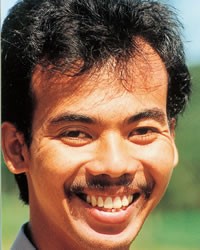Osing in Indonesia

Photo Source:
Copyrighted © 2026
Anonymous All rights reserved. Used with permission |
Send Joshua Project a map of this people group.
|
| People Name: | Osing |
| Country: | Indonesia |
| 10/40 Window: | Yes |
| Population: | 355,000 |
| World Population: | 355,000 |
| Primary Language: | Osing |
| Primary Religion: | Islam |
| Christian Adherents: | 2.01 % |
| Evangelicals: | 1.04 % |
| Scripture: | New Testament |
| Ministry Resources: | Yes |
| Jesus Film: | Yes |
| Audio Recordings: | Yes |
| People Cluster: | Java |
| Affinity Bloc: | Malay Peoples |
| Progress Level: |
|
Introduction / History
The Jawa Osing reside in the Banyuwangi district of the East Java Province and seem to be the original occupants of this eastern-most area of Java. The Jawa Osing are part of the Jawa cluster of peoples, but they have their own cultural variations which differ from other Jawa peoples. Banyuwangi is a transit city for tourists who are en route to Bali. It seems Banyuwangi was the capital city of the Hindu Blambangan Kingdom, which was the last kingdom in Java. The Osing history began at the end of the Majapahit Kingdom in 1478. Civil war and the growth of Islamic Empires, especially the Malacca Sultanate, accelerated the fall of Majapahit Kingdom. After the fall of the Majapahit Kingdom, some of the Majapahit people fled to places such as Mount Bromo (Tengger), Blambangan or Banyuwangi (Osing) and Bali. The Osing speak Ngoko Osing (Osing language). For other people groups of Java, this language is considered old-fashioned and corrupted by the Madura language.
What Are Their Lives Like?
Family, housing, food, as well as social and health patterns of the Jawa Osing are very characteristic of the Jawa culture, but the Bali culture has also influenced them. One example is the Janger dance. This dance has the theme of love and is performed to the rhythm of the two-sided drum (kendang kempul). Their clothing is Jawa in style, but the wigs (sanggul) used resemble those of the Bali people. Many of the Jawa Osing people make their living by farming, raising livestock and trade. In addition, some work as local government officials or private employees. They never experience water shortages because they live on the slopes of the Ijen-Merapi volcano. The Jawa Osing take great care and highly value preserving their relationships with relatives, whether they are near or far. Good relationships with others are also maintained through mutual sharing and giving, as well as trying to understand other people's feelings and abilities. This practice is summarized as tepo seliro, which means not doing something one would not want done to oneself. The Jawa Osing are known as hospitable and well-mannered people. Their culture, which is under government protection, has become popular and interesting to tourists. The government wishes to preserve and utilize the unique beliefs and culture of the people. This has added to the pride the Jawa Osing take in their culture.
What Are Their Beliefs?
Islam became the dominant religion of the Jawa Osing after Hinduism was pushed from their area to Bali. The Kyai (Islamic teacher) has the ultimate authority in matters of religion. The Jawa Osing have many selametan (ritual meals) specific to each occasion, such as: the death of a family member, the cleaning of the village, tilling and harvesting the land, birth, marriage and moving to a new house. Selametan combine a mixture of Jawa and Islamic cultural ceremonies and are thus also done for Islamic holidays. A few of these days are: Suran, Muludan, Ruahan, Punggahan, Rejabatan and Sekaten. The traditional dukun (shaman/healer/occultist) is famous for his ability to apply his black magic from far distances. The Jawa Osing believe that through his magical powers he can heal or destroy whoever or whatever is a cause of problems.
What Are Their Needs?
As farmers and livestock breeders, the Jawa Osing are somewhat limited in their abilities. Because of this, they need to be properly trained in small-scale technology to raise their level of productivity.
Prayer Points
Pray for the gospel to come to this people group soon!